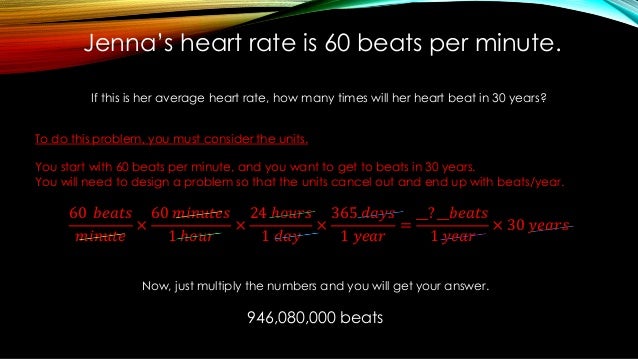
Doctors consider a heart rate below 60 beats per minute as low, Dr. Baez-Escudero says. If you have bradycardia, you’ll have a sustained heart rate below 60 even when you’re awake and active. When a person is relaxed, his /her heart beats at a slower pace. When a person is nervous or performs some kind of physical activity, the heartbeat speeds up. To get the period between heartbeats, 1 minute or 60 seconds must be divided by the number of beats per minute. For example, if the heart beats 70 times per minute, we divide 60 second by 70.

| Bibliographic Entry | Result (w/surrounding text) | Standardized Result |
|---|---|---|
| The New Book Of Popular Science. 1994: 197. | 'It beats or contracts about 70 times per minute' | 0.86 s |
| Simmers, Louise. Diversified Health Occupations. 2nd edition. 1988: 157. | 'Adults have a general wide range 60-90 beats per minute. Infants:90-140 beats per minute' | 1.00–0.67 s (adults) 0.60–0.43 s (infants) |
| 'Keeping the beat.' Harvard Health Letter. 20, 8 (June 1995): 1. | 'When a healthy person relaxes on a park bench, the heart beats an average of 70 times per minute' | 0.86 s |
| Friedberg, K. Charles. Diseases of the Heart. 1956: 323. | 'The normal heart rate of adults at rest varies between 60 and 90 per minute while that of infants ranges between 100 and 150' | 1.00–0.67 s (adults) 0.60–0.40 s (infants) |
The heart is a hollow, muscular, fish-shaped organ about the size of a closed fist. It's located approximately in the center of the chest. The average adult human heart weighs about 300 grams in men, and about 200 grams in women. Human heart begins beating or contracting early in fetal life a continues regular beating throughout the life span, stopping only at the time of death.
About 50 million gallons of blood pass through the heart in an average lifetime. The heart beats about 70 times per minute at rest in adults, and from 90 to 140 times in infants. Smaller hearts pump less blood with every beat than larger hearts. As a result, smaller hearts need to increase their pumping capacity over time, a task they accomplish by beating faster. In addition to age and body complexion, physical and emotional state also affects the rate of heart beat. When a person is relaxed, his /her heart beats at a slower pace. When a person is nervous or performs some kind of physical activity, the heartbeat speeds up.
To get the period between heartbeats, 1 minute or 60 seconds must be divided by the number of beats per minute. For example, if the heart beats 70 times per minute, we divide 60 second by 70.

All data from different sources pretty much agreed with each other because the rate of heart-beats is relatively stable for all healthy people (of course, there are small differences because everyone is different).
Pavel Matskevich -- 1998
| Bibliographic Entry | Result (w/surrounding text) | Standardized Result |
|---|---|---|
| Structure and Function of the Body. 9th ed. 1992: 231. | 'The heart is beating at an average rate of 72 beats per minute.' | 0.83 s |
| Groliers Encyclopedia USA. Groliers, 1996: 121. | 'At birth the heart beat may be up to 150 times per minute.' | 0.40 s |
| Vinstein, John. Heart and Eating Habits. vol. 3. 1995: 364. | 'The typical heart rate is 72 beats per minute.' | 0.83 s |
| Givan, Erica. The Healthy Heart and How It Works. | 'In humans, an infant's hear beats 120 times per minute.' | 0.50 s |
| World Book Encyclopedia. World Book, 1996: 207. | 'Many well trained athletes have lasting rates from 40-60 beats per minute.' | 1.0 s–1.3 s |
The human heart in an adult is about the size of a fist. The size and weight of the heart varies directly with the size and weight of the person. However, the heart of a professional athlete is heavier since it has more muscle but there is a very slight change in volume. The approximate weight of the human heart is 0.5% of a person's weight.
Average Heart Beat Per 10 Seconds
The heartbeat is caused by the contraction and relaxation of the heart chambers which produce the 'lub dub'sound. The contraction and relaxation is triggered by the electrical impulses sent by specialized cells. During an exercise when the body needs more oxygen, the rate of the impulses is increased in order to increase the frequency of the heartbeats.
While resting, the number of heartbeats per minute depends on the general conditioning of the person. If the person is well conditioned, then his or her heart is stronger and it takes fewer contractions for the heart to pump the necessary amount of blood throughout the body.
In order to obtain the period of the heartbeat is determined by the time between two consecutive heartbeats. The unit of time is seconds, and there is 60 seconds in each minute. The average heartbeat rate is 72 beats per minute. In order to get the value of the period number of seconds is divided by the number of beats.
Heart Beat Per 15 Seconds
Eugene Fialkovskiy -- 1998

